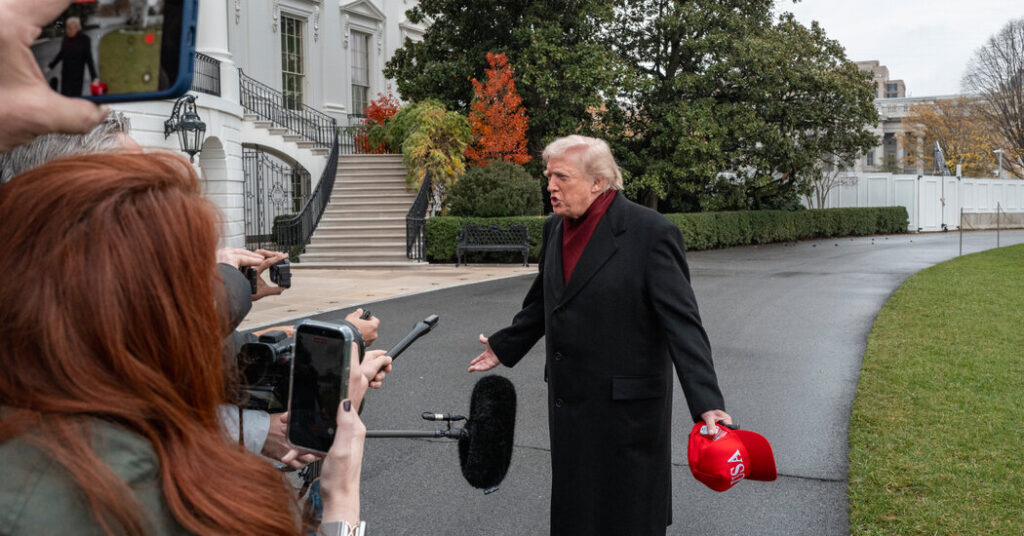President Trump, who has repeatedly denounced the Affordable Care Act as a “disaster,” is considering backing an extension of health care subsidies tied to the health law that are set to expire at the end of the year, according to a senior White House official.
Mr. Trump has not made a final decision, the official said. The person spoke on the condition of anonymity to discuss continuing deliberations.
“Until President Trump makes an announcement himself, any reporting about the administration’s health care positions is mere speculation,” said Kush Desai, a White House spokesman.
Extending the subsidies was at the center of the 43-day government shutdown, the longest in U.S. history, with Democrats insisting on a vote to extend them while Republicans said they would make no commitment while the government was closed.
Now that the shutdown is over, Mr. Trump is under pressure to deliver on a plan to address health care costs, especially as the subsidies that millions of people rely on to pay for coverage are expiring, which would cause a jump in premiums. The president and his administration have also sought to hone a broader affordability message as many Americans struggle with living costs.
The White House official said Mr. Trump was considering whether to impose tougher restrictions on who would be eligible for the subsidies. The White House did not provide details on what those restrictions might be, though they could include capping eligibility for wealthier Americans and requiring all enrollees to pay a minimum premium.
In floating the idea to extend the subsidies, the Trump administration has the opportunity to gauge the response from lawmakers, including conservative Republicans who have long targeted the Affordable Care Act for failing to sufficiently constrain health care costs.
Word of Mr. Trump’s deliberations have caused considerable pushback from Capitol Hill — both from the right and the left — and underscored how difficult it would be to get any health care policy passed in a deeply divided Congress.
“A vote to extend Obamacare… that’s the Republican solution to health care?” asked Representative Thomas Massie, the libertarian Kentucky Republican, on social media.
Signed into law by former President Barack Obama in 2010, the Affordable Care Act, which created the program popularly known as Obamacare, created subsidies, including tax credits, to help uninsured people buy health insurance. Congress passed extra subsidies in 2021, in the thick of the coronavirus pandemic, and extended them in 2022.
The issue spotlights the difficulty Republicans have had in coming up with an alternative to the Affordable Care Act. While running for the White House last year, Mr. Trump memorably said that he had the “concepts of a plan” to replace the program, but none was forthcoming.
Senator Bill Cassidy, Republican of Louisiana and the chairman of the Senate health committee, recently floated an alternative. It calls for the federal government to give the money it spends on tax credits under the health law directly to consumers, who could put them in a health savings account and use them toward out-of-pocket costs or deductibles.
“It gives power to the patient,” Mr. Cassidy said Sunday on CNN.
Mr. Trump recently floated a similar proposal on social media. “THE ONLY HEALTHCARE I WILL SUPPORT OR APPROVE IS SENDING THE MONEY DIRECTLY BACK TO THE PEOPLE, WITH NOTHING GOING TO THE BIG, FAT, RICH INSURANCE COMPANIES, WHO HAVE MADE $TRILLIONS, AND RIPPED OFF AMERICA LONG ENOUGH,” he wrote, in all capital letters on his Truth Social platform.
The Obamacare tax credits, however, do not go to insurance companies; they help consumers offset the costs of their health care premiums. Democrats and independent analysts say Mr. Cassidy’s plan would barely make a dent in costs.
Conservatives say the subsidies are unsustainable. The Congressional Budget Office has estimated that making the extra subsidies permanent would increase the number of people with health insurance by 3.8 million between 2026 and 2035, but would add $350 billion to the federal deficit.
With just five weeks to go until those extra subsidies expire, Mr. Trump and his fellow Republicans have been feeling intense pressure to act. The price of insurance is already going up, and the president and his party can ill afford to be blamed for making costs for many go even higher when voters are already struggling to pay their bills.
“Yes, they can say Obamacare was created by Democrats, the timetable and the subsidies were all created by Democrats,” said Douglas Heye, a Republican strategist who worked on Capitol Hill when the Affordable Care Act became law in 2010. “But they’re in charge, and so if those bills skyrocket, that’s who voters are going to look to to fix it.”
Some Republicans are already saying just that. Representative Marjorie Taylor Greene of Georgia, who shocked Washington last week by announcing that she would resign, broke with her party on health care in October during the shutdown. She said then that while she was “not a fan” of Obamacare, she supported extending the subsidies.
“Let’s just say as nicely as possible, I’m not a fan,” Ms. Greene wrote on social media. “But I’m going to go against everyone on this issue because when the tax credits expire this year my own adult children’s insurance premiums for 2026 are going to DOUBLE, along with all the wonderful families and hard-working people in my district.”
The Committee for a Responsible Federal Budget has also raised concerns about the costs of extending the expiring Affordable Care Act subsidies, even with modifications.
The organization says extending subsidies, even with an eligibility cap of about $225,000 for a family of four, would still cost roughly $50 billion in the first two calendar years.
Republicans have never liked the Affordable Care Act, both for philosophical reasons and because the legislation’s association with Mr. Obama irritates them. When the law was enacted, they sued to overturn it (and won a partial victory in when the Supreme Court struck down a provision expanding Medicaid nationwide) and vowed to “repeal and replace it.”
They came close to repealing it early in Mr. Trump’s first turn, until Senator John McCain, Republican of Arizona and a nemesis of the new president, returned to Washington while undergoing treatment for brain cancer to vote on the repeal legislation, only to kill it with a thumbs down on the Senate floor.
Replacing the Affordable Care Act has proved just as difficult. Mr. Heye recalled how four prominent Republican committee chairmen — including Paul Ryan, a future speaker of the House — met in 2014 to try to come up with a replacement proposal.
“They never even put out a white paper because those four couldn’t agree,” Mr. Heye said. “There were no fights or anything like that. Republicans have historically struggled to say what they’re for when it comes to health care.”
Luke Broadwater covers the White House for The Times.
The post Trump Is Considering Push to Extend Obamacare Subsidies appeared first on New York Times.




